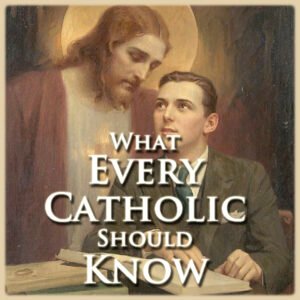What are the traditional laws of Fast and Abstinence?
Why does the Church command the faithful to Fast?
In our day and age we have lost the concept of penance and reparation. For this reason, it seems to some that the imposition of fasting and penance is something burdensome and not fitting our society.
But this is easily understood, if one simply makes a comparison. Is it not true that a good Father or Mother will often deprive their children of things they find enjoyable, such as candy or junk food? Is it not also a common thing to see a good Father or Mother imposing displeasing things upon their children in order to procure their health?
Well, our Good Holy Mother the Church, guided by the Holy Ghost, imposes to us penance for the same reason. In doing so, The Church is but following the command of our Lord, “Unless you do penance, you shall likewise perish.” (St. Luke. 13:5).
Penance is necessary on several accounts.
- To do reparation to the Glory and honor of God, who is offended by our sins, and the dereliction of his law.
- To restore the faculties and powers of our soul, which are diminished and suffer a certain damage on account of our subjecting them to sin.
- To prevent further relapse into sin.
The current binding laws of Fast and Abstinence.
The Laws that prevail in our current situation of Crisis in the Church, are those enacted before the pontificate of John XXIII.
The uniform norms for fast and abstinence adopted in 1951 by the Bishops of the United States were somewhat modified at their November 1956 meeting. The regulation on this matter now read as follows:
Abstinence
- Everyone over seven years of age is bound to observe the law of abstinence.
- Complete abstinence is to be observed on fridays, Ash Wednesday, Holy Saturday, and the Vigils of the Immaculate Conception and Christmas. On days of complete Abstinence, meat and soup or gravy made from meat may not be used at all.
- Partial Abstinence is to be observed on Ember Wednesdays and Saturdays and on the Vigil of Pentecost. On days of partial abstinence, meat and soup or gravy made from meat may be taken only once a day at the main meal.
Fast
- Everyone over 21 and under 59 years of age is also bound to observe the law of fast.
- The days of fast are the weekdays of Lent, including Holy Saturday, the Ember Days and the Vigils of Pentecost, the Immaculate Conception and Christmas.
- On days of Fast, only one full meal is allowed. Two other meatless meals, sufficient to maintain strength, may be taken according to one’s needs; but together they should not equal another full meal.
- Meat may be taken at the principal meal on a day of fast except on Fridays, Ash Wednesday, Holy Saturday, and the Vigils of the Immaculate Conception and Christmas.
- Eating between meals is not permitted, but liquids, including milk and fruit juices, are allowed.
- Where health or ability to work would affected, the law does not oblige. In doubt concerning fast or abstinence, a parish priest or confessor should be consulted.
- There is no obligation for fast or abstinence on a Holy Day of obligation, even if it falls on a Friday.


